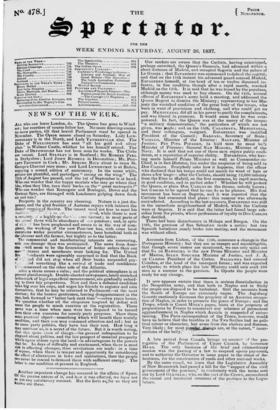NEWS OF THE WEEK.
ALL who can leave London, do. The Queen has gone to Wind sor; her courtiers of course follow her. No more drawing-rooms no more parties, till that horrid Parliament must be opened in November. The Opera season closed on Saturday. Lady Lost- Dosiesaav is in the North, and Lady TANKERV I LLE also. The Duke of WELLINGTON has sent •' all his gold and silver plate" to Weimer Castle, whither he has himself retired. The Duke of DEVONSHIRE has not been seen for weeks. The Clubs are vacant. Lord STANLEY iS in Scotland ; Sir ROBERT PEEL in Derbyshire ; Lord JOHN RUssELL in Devonshire ; Mr. Pop- Utrr THOMSON in Cork ; Mr. SPRING RICE about to cross St. George's Channel once more; and Lord LYNDHURST is at Baden, enjoying a second edition of matrimony. In the mean while, grouse are plentiful, and partridges " strong on the wing." The 12th of August has passed, and the 1st of September is at hand. Who can wonder that the happy mortals who may go where they like, when they like, turn their backs on the" great metropolis?" Who can wonder that Ramsgate and Boulogne, Dover and the German Spas, are thronged with Londoners gulping down fresh air and ices?
Prospects in the country are cheering. Nature is a just dis- penser, and the glad fruition of' Autumn repays with interest the dismal nropjsc of Spring. The Senant need not fear to meet his
r, fsood, while there is now a certainty .,1* a highly-pi, die 1.... „in) naivest ; in most parts of the island there will be abundance of ..lie potatoes ; and, in spite of all t. .t has been prophesied and sworn to in the way of com- plaint, the working of the new Poor-law has, with some local exceptions under peculiar circumstances, been beneficial both to the labourer and the farmer, but highly so to the latter.
The commercial and , manfacturing interests are recovering, vith seas damage than was anticipated. The news from Ame- icduld seem to be the forerunner of better orders than our ssale-p- ::turers and merchants were looking for. The United Sty v-erchants were agreeably surprised to find that the Bank of s ::nd did not stop when all their banks suspended pay- ? ...nd something like a revival of trade and confidence I • ienmenced on the other side of the Atlantic.
After a storm comes a calm ; and the political atmosphere is at present placid enough. Double-sheeted newspapers, lately stretched to the crack of legal superficial measurement, are gradually subsid- ing to their fair proportions. Now and then a defeated candidate talks big over his cups, and urges his friends to register and ruin themselves, that he may be returned to Parliament—at the next election; for the beaten gentlemen, leaving disappointment in the rear, look forward to " better luck next time"—seven years hence. We question whether all the eloquence inspired by defeat will rouse the people to much exertion at the registration. There Dever was a time when men were less disposed to be turned from their own concerns for merely party purposes. Show them some practical object--something which will benefit their worldly condition, and then you may command attention and aid ; but as for mere party politics, they have lost their zest. How long it may continue so, is a secret of the future. But it is worth noting, that this quiet state of things—the general indisposition to be plagued about politics, and the fair prospect of material prosperity which again shines upon the land—is advantageous to the powers that be. In days of difficulty and excitement, when there is most risk in effecting changes, then revolutions are made : in a time of repose, when there is temper and opportunity for considering the effect of alterations in laws and institutions, then the people can never be roused to demand them with sufficient energy. The latter is our condition at present in England.


























